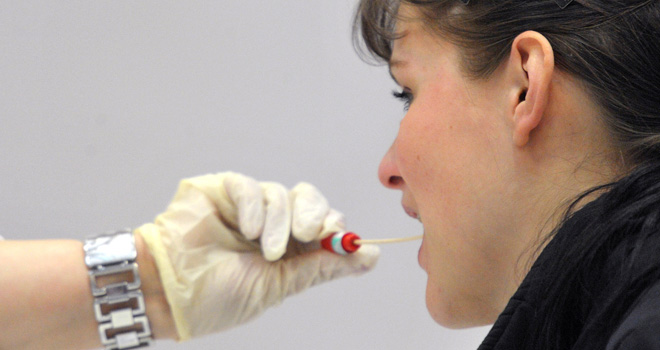Just because a new bit of science or technology exists to solve a problem, should we use it without question?
Even if it offers to solve a heinous crime, the answer is “no” if its use is mandated by badly-crafted law, and violates the spirit of the Fourth Amendment, says a recently-issued California state appeals court opinion.
First District Justice J. Anthony Kline said that a California law that requires the police to collect and store the DNA of anyone they arrest violates the right of individuals to be free from unreasonable searches and seizures.
The opinion strikes down the requirement that police throughout California immediately collect the DNA of people they arrest. A spokesman for California’s Attorney General Kamala Harris said that the office is reviewing the opinion.
Many other states have similar laws, and federal code also requires the cops to immediately collect and store the DNA of anyone they arrest. The Third Circuit ruled 8-6 late last month that the federal law doesn’t constitute unreasonable search and seizure, and that the feds’ use of DNA is the same as the use of fingerprints to identify someone.
President Obama in 2010 said that he supported the idea of police immediately collecting the DNA of people they arrest without having first being convicted of a crime.
The California case concerns a convicted arsonist in San Francisco who objected to his DNA being collected prior to his conviction at the time of his arrest. He was subsequently slapped with an extra six months in jail because of his resistance.
The California law is a result of a 2006 proposition, and it requires law enforcement authorities to collect the DNA of anyone that they arrest at the time that they are booked, and to store it in databases that can be accessed by both federal and other state law enforcement authorities.
Kline said that the approach, and the subsequent scanning of databases to find potential matches with DNA collected from crimes scenes, turns the traditional process of presuming people to be innocent until proven guilty on its head.
“Even if DNA testing of arrestees was demonstrably valuable to law enforcement, the effectiveness of a crime fighting technology does not render it constitutional,” he wrote.
The opinion examines in detail the nature of genetic profiling: how it works, and why it is useless as a tool for simply identifying an individual in the law enforcement context, and why it is instead serving as a tool for “searching” an individual on a random basis.
Kline said that genetic profiling can’t be compared to fingerprinting because it can’t be used by law enforcement officials to quickly verify the identity of individuals. The officials have to first obtain individuals’ fingerprints to immediately verify their identities, and then those fingerprints are linked to the genetic profiles, which take a month to process after the sample is taken.
Instead, law enforcement officials use the genetic profiles to figure out whether the person’s genetic information matches any material taken from crime scenes around the country.
“By merging the ordinarily distinct concepts of verification of identity and criminal investigation, the DNA Act authorizes suspicionless criminal investigation of arrestees in the name of ‘identification,’ absent any true need or ability to use the material collected to verify identity at the time of arrest,” Kline wrote. “Unlike the case with fingerprints, upholding the collection of DNA from arrestees on the theory that it is acquired purely for identification purposes is delusory. The value and primary use of DNA is investigatory; the DNA may be useful for determining who a person is, but this is not the use to which it is put at the time of arrest and it us not necessary for that purpose.”
Advocates for DNA collection at the time of arrest have said that they plan to appeal the ruling.
Many relatives of victims of violent crimes are understandably for the legislation, while civil liberties advocates decry the government’s stockpiling of Americans’ genetic information.
You’ll be hearing much more about the issue in coming months: Another challenge to the California law by a participant of a peace rally (who had been arrested and released without being charged with anything) is awaiting action at the Ninth Circuit Court of Appeals.









